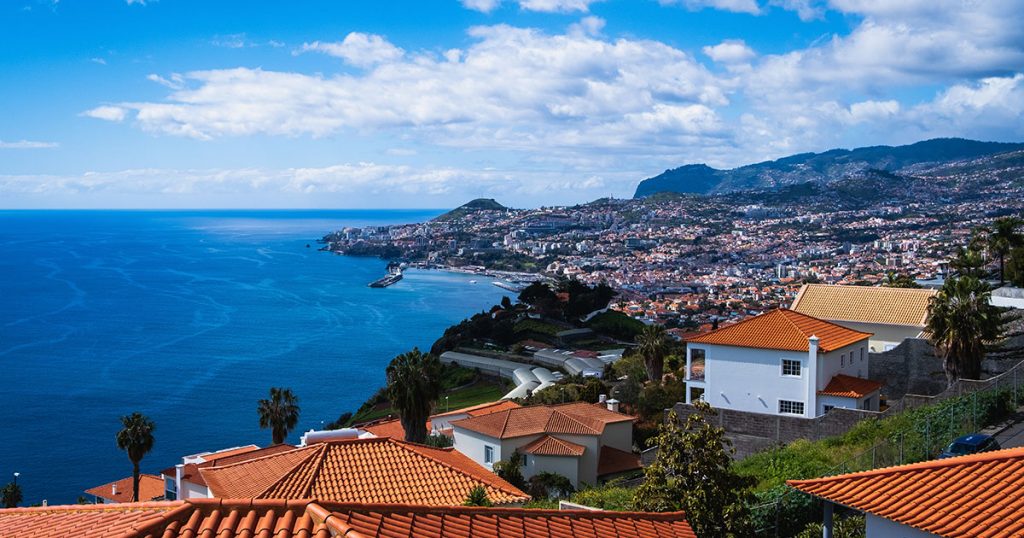Portugal isn’t a tax-free country, despite its popularity from the previous Non-Habitual Resident (NHR) tax regime. The NHR program was used to offer tax-free global income and reduced rates on certain Portuguese business activities. This program closed in January 2024, and its transition period will end in March 2025.
Tax rules in Portugal work differently for residents and non-residents. Residents must pay progressive tax rates that range from 13% to 48% in 2025. Non-residents pay a flat 25% tax on income they generate within Portugal. Many expats and digital nomads think about moving to Portugal, especially when you have places like Madeira Island. The digital world has changed a lot since the NHR’s closure. Portugal might not be completely tax-free, but it still gives people advantages through its replacement programs and regional incentives.
Is Portugal a tax-free country?
Many people believe Portugal offers a tax-free environment, but this idea needs some clearing up. You might have heard rumours about Portugal’s tax benefits, but the real story is much more complex than just “tax-free.”
Understanding the term ‘tax-free’
Real tax-free countries don’t charge income taxes to their residents or businesses. Monaco, the Bahamas, and the United Arab Emirates fit this description. Portugal works quite differently – it has a complete tax system with substantial rates for its residents.
Portugal uses a progressive tax structure that goes from 13% to 48% in 2025. On top of that, it charges an extra solidarity rate between 2.5% and 5% for people earning over €80,000 and €250,000. These numbers show Portugal is far from being a tax-free country.
This misunderstanding comes from Portugal’s old Non-Habitual Resident (NHR) program, which gave newcomers great tax benefits. All the same, even with this program, Portugal was never truly “tax-free.” The NHR program, 15 years old, offered:
- Tax exemptions on most foreign-source income if it could be taxed in the source country
- A flat 20% tax rate on Portuguese-source income from high-value professions
- A 10% flat tax on pension income (after 2020 reforms)
The NHR program didn’t just automatically free all income from taxes. You had to live in Portugal, which meant staying there at least 183 days each year.
Portugal’s global tax reputation
Portugal sits at 35th place in the 2024 International Tax Competitiveness Index, down one spot from 2023. This middle-of-the-pack ranking shows Portugal’s higher tax burden than other OECD nations.
Portugal has the second highest corporate tax rate in the OECD at 31.5%, including various top-up taxes. The country also uses a highly progressive tax structure for corporate income, which sets it apart from any tax-free label.
Portugal’s tax world changed in early 2024 when the NHR regime ended. The program brought in about 74,000 people between 2009 and 2022. Now we have the more limited Incentive for Scientific Research and Innovation (IFICI) program – some call it “NHR 2.0.”
Madeira Island deserves special mention. This autonomous region offers unique tax incentives through its International Business Center. Though part of Portugal, Madeira’s tax advantages can really appeal to international businesses and remote workers.
Portugal’s changing tax policies show how European countries try to balance attracting talent with keeping a steady tax income. The country still offers better tax deals than many Western European nations in specific cases.
Looking at real “no tax countries” makes the difference clear. Monaco and the Bahamas charge little to no income tax at all, while Portugal runs a complete tax system with significant rates for most residents.
People think Portugal is tax-free because they don’t fully understand how the old NHR regime worked. Even NHR members had to follow specific rules, file yearly tax returns, and sometimes pay taxes based on where their money came from.
If you’re thinking about moving to Portugal for tax reasons, especially to Madeira Island, you should talk to qualified tax advisors who know the current rules. Don’t rely on old or oversimplified information you find online.
How Portugal taxes residents and non-residents
Portugal’s tax system makes a clear difference between residents and non-residents, with each group having very different tax obligations. You need to know these differences because Portugal isn’t one of those “no tax countries.” The country has a detailed tax structure that decides your tax bill based on where you live.
Resident vs. non-resident tax rules
Your tax status in Portugal depends on where you live. Portuguese tax law says you’re a tax resident if you meet one of these conditions:
- You stay more than 183 days (consecutive or not) in Portugal during any 12-month period starting or ending in the fiscal year
- You have a home in Portugal during this period and plan to make it your main residence
This difference matters a lot because Portuguese tax residents pay taxes on their worldwide income, no matter where they earn it. Non-residents pay taxes only on money they make within Portugal.
Madeira Island follows these same residency rules. The island’s International Business Center offers extra benefits within Portugal’s tax system.
Your tax residency starts on your first day in Portugal and ends when you leave, with some exceptions. The timing can make a big difference to your tax planning, especially in your first year.
Progressive tax rates for residents
Residents pay progressive taxes in 2025, with rates from 13% to 48%. These rates apply to all your worldwide income from jobs, businesses, investments, real estate, capital gains, and pensions.
High earners pay an extra solidarity surcharge:
- 2.5% on yearly taxable income between €80,000 and €250,000
- 5% on yearly taxable income above €250,000
Since 2015, married couples usually file taxes separately. Both married couples and civil partners can choose to file jointly. Joint filers split their taxable income in half before tax rates apply.
Portuguese residents must file their tax returns between April 1 and June 30 for the previous tax year, even if they already paid taxes through withholding.
Flat tax for non-residents
Non-residents have a simpler tax setup that changes based on income type. They pay flat taxes only on money earned in Portugal.
Non-residents’ job income gets taxed at a flat 25%. Business and professional income also face a 25% flat tax. This makes tax math easier than the resident system.
Here are the flat rates for other types of income:
- Interest: 28%
- Dividends: 28%
- Capital gains from selling shares: 28% (unless exempt)
- Capital gains from real estate/movable assets/crypto: 28%
- Rental income: 5% to 28% (based on contract terms)
- Pension income: 25%
Before 2023, non-residents paid a 28% flat rate on property capital gains. Now they follow resident rules, which means including 50% of capital gains and paying progressive rates.
These non-resident tax rules matter if you’re moving to Madeira Island, especially during your transition. Once you become a resident, you’ll switch to resident tax rules unless you qualify for special programs through Madeira’s International Business Center.
The big differences between resident and non-resident taxes mean that planning your move date and residency status can save you money. Portugal has a complete tax system, not a tax-free zone like some people think.
The end of NHR and what replaced it
Portugal drew thousands of foreign residents with its generous tax incentives over the last several years. The government completely changed its approach to tax benefits for newcomers. This marks the most important change in Portugal’s strategy as a destination for tax-conscious expatriates.
What was the NHR regime?
Portugal launched the Non-Habitual Resident (NHR) tax regime in 2009. This became the country’s flagship program to draw wealthy foreigners, digital nomads, and retirees. The tax incentive gave qualifying residents exceptional benefits for 10 years:
- A flat 20% tax rate on Portuguese-source income from high-value professions
- A reduced 10% tax rate on foreign pension income (after 2020)
- Tax exemptions on most foreign-sourced income
The program turned into a soaring win and brought more than 10,000 non-habitual residents. The annual tax revenue Portugal exempted through the NHR regime went beyond €1.21 billion by 2021, up from €770 million in 2019.
The NHR regime made Portugal one of Europe’s most tax-friendly nations. The country wasn’t truly one of the “no tax countries” since it managed to keep standard taxation for residents after the 10-year benefit period.
The end of an era
Then-Prime Minister Antonio Costa announced the NHR regime would end in October 2023. The Portuguese Parliament made it official on November 29, 2023, by approving the State Budget for 2024.
The decision came down to several factors:
- Fiscal costs went beyond €1 billion each year
- Housing prices kept rising and affected local residents
- Political pressure built up to reform tax incentives for foreigners
The core team pointed out NHR’s success in building long-term residency. About 59% of NHR beneficiaries stayed in Portugal even after their 10-year tax advantages ran out.
The program ended on January 1, 2024. A transition phase let people apply until March 31, 2025 if they had started the process earlier. All registered beneficiaries keep their benefits for the full 10-year period.
Introduction to the IFICI regime
Portugal replaced NHR with the Tax Incentive for Scientific Research and Innovation (IFICI) regime on January 1, 2024. People often call it “NHR 2.0.”
IFICI does more than just support research activities. The program targets highly qualified professionals who move to Portugal to live and work. This includes people in technology, higher education, and certain corporate structures.
Madeira Island residents can tap into the full potential of IFICI. They might combine these benefits with the Madeira International Business Center advantages to create better tax options.
Key benefits of IFICI for new residents
IFICI gives qualifying residents these tax advantages for 10 straight years:
- A 20% flat tax rate on qualifying Portuguese-source employment and self-employment income
- Complete tax exemption on foreign-sourced income including employment income, business profits, dividends, interest, rental income, and capital gains
The new regime comes with some clear limits:
- Foreign pension exclusion: IFICI doesn’t help with foreign pensions. These face standard progressive rates up to 53%
- Previous beneficiaries excluded: People who got NHR benefits can’t apply for IFICI
- Five-year absence requirement: You need to show you weren’t a Portuguese tax resident in the last five years
- Qualifying activities limitation: The program only accepts specific professions in education, research, technology, and certified startups
IFICI focuses on economic growth rather than just cutting taxes. The program wants professionals who add value to Portugal’s innovation ecosystem. This matches well with Madeira Island’s growing technology and business services sectors.
This is a fundamental change in how Portugal wants to balance tax competitiveness with targeted economic benefits. IFICI might be more restrictive than NHR, but it keeps Portugal attractive for taxes within Europe, even if it’s nowhere near being a “no tax country.”

Foreign income and tax exemptions in Portugal
Tax-free living in Portugal might sound appealing, but you need to know how the country handles foreign income. Portuguese tax laws apply to all worldwide income. However, the tax system offers several ways to lower your tax burden on foreign income, which makes Madeira Island an attractive option.
How foreign income is treated
Portuguese residents pay taxes on their worldwide income. The good news is that the Incentive for Scientific Research and Innovation (IFICI) regime lets qualified residents skip taxes on several types of foreign income:
- Employment income
- Business and professional income
- Investment income (including dividends and interest)
- Rental income from foreign properties
- Capital gains
This works as an “exemption with progression.” Your exempt income doesn’t get taxed directly, but it still counts toward determining tax rates for other income. This means your tax-free foreign income could push your Portuguese income into higher tax brackets.
Madeira Island residents follow these same rules as mainland Portugal. The combination with Madeira’s International Business Center perks can lead to better tax benefits.
Double tax treaties and credits
Portugal has tax agreements with 79 countries. These Double Taxation Agreements (DTAs) protect you from paying taxes twice on your income. Most income types get taxed mainly in the source country.
Money coming from a country with a Portuguese DTA qualifies you for tax credits. You’ll get the lower amount of:
- The tax you paid abroad, or
- The part of Portuguese tax linked to that foreign income
Living in Madeira means you might avoid double taxation on investments or business income from your home country through these agreements.
Portugal helps even without a DTA by offering tax credit relief. This equals either the foreign tax paid or the portion of Portuguese tax on that income, whichever is lower. Unlike companies, people can’t carry forward foreign tax credits for five years.
Portuguese residents working temporarily abroad can exempt up to €10,000 of yearly employment income. This helps those who work internationally but keep their Portuguese residency.
Foreign housing and child tax exclusions
Moving to Madeira from the US? You might save money through foreign housing exclusions. These let eligible people exclude certain housing costs from their taxable income.
Housing expenses you can claim include:
- Rent payments
- Utilities (excluding telephone and internet)
- Property insurance
- Leasing fees and furniture rental
- Parking and repairs
The math is simple: subtract a base housing amount (usually 16% of the maximum foreign earned income exclusion) from your total qualified housing expenses.
Portugal rewards families too. Each dependent child typically qualifies for a tax credit that lowers your overall tax bill.
Setting up home in Madeira Island can lead to big tax savings. Just remember that Portugal isn’t completely tax-free, but these benefits can reduce what you owe.
Is Madeira Island a tax-free within Portugal?
Madeira Island holds a unique spot in Portugal’s tax system through its International Business Center (MIBC). Many people call it a “tax haven,” but it’s really a “low tax” area that follows EU rules.
The Madeira International Business Center
The EU approved MIBC back in the 1980s to help grow this remote region’s economy. Unlike tax havens, Madeira serves as a real economic growth tool with EU-backed tax benefits that run until 2028.
Madeira’s main draw is its 5% corporate tax rate. This is a big deal as it means that companies pay much less than mainland Portugal’s 21% or even Madeira’s regular 14.7% rate. Business owners and remote workers who set up companies on the island can benefit from these tax advantages.
Companies need to meet these requirements to get the benefits:
- Create between 1-5 jobs in the first 6 months and invest €75,000 in fixed assets, or
- Create 6+ jobs in the first 6 months (no minimum investment required)
Madeira’s tax residents must fill these jobs to ensure the island’s economy benefits.
Companies registered with MIBC get more than just lower tax rates. They also receive:
- 80% exemption from stamp duty on contracts and documents
- 80% exemption from property taxes and transfer taxes
- Exemption from withholding tax on dividends paid to non-resident shareholders
- Access to Portugal’s extensive network of double taxation treaties
The European Commission has backed Madeira’s tax system multiple times (in 2002, 2007, 2013, 2014, and 2015), making it legitimate within the EU framework. This sets Madeira apart from typical offshore centers or blacklisted areas.
If you have plans to move to Madeira, MIBC rules can help optimize your taxes along with Portugal’s broader tax structure. Non-Portuguese crew members working on commercial ships registered in Madeira’s International Shipping Registry don’t pay personal income tax.
MIBC comes with some limits. Financial services, insurance, and intra-group activities like management consultancy can’t get these benefits. Tax benefits also have caps based on gross added value, labour costs, or turnover.
As Portugal winds down its NHR program, Madeira’s special tax status becomes more valuable to those looking for tax efficiency in the EU. Unlike zero-tax countries, Madeira keeps a regulated system with clear requirements, making it ideal for real business operations rather than just avoiding taxes.
Common tax mistakes expats make in Portugal
Tax mistakes can get pricey for expats looking to move to Madeira Island. These errors often lead to penalties, double taxation, or missed opportunities. A good grasp of common pitfalls will help you navigate Portugal’s complex tax system smoothly.
Misunderstanding residency rules
Many expats don’t realize exactly when they become Portuguese tax residents. The rule is straightforward – staying in Portugal for 183 days in any 12-month period makes you a tax resident automatically. You might become a resident even earlier if you have a regular home in Portugal that serves as your main residence.
The risk of triggering tax residency back home needs careful attention, especially if you plan regular visits. To cite an instance, UK rules state that just 16 days in the country could accidentally make you a UK tax resident again.
Smart timing of your move makes a big difference. The best time to relocate is at the UK tax year-end on April 5 to reduce cross-border issues. If this timing doesn’t work, you should learn about Portugal’s split-year rules that might apply when you start working overseas full-time.
Missing deadlines or incorrect filings
Portuguese tax returns must be submitted between April 1 and June 30. Late submissions start with a €25 penalty and increase based on how long you delay and the tax amount you owe. Missing these deadlines also means:
- Interest charges on unpaid tax
- Blocked tax refunds
- You might lose special regime benefits
People living outside the EU need a fiscal representative – a requirement many forget. Using wrong forms creates problems too, as foreign income needs specific forms like Annex J.
Overlooking foreign income reporting
The biggest mistake happens when residents fail to declare their worldwide income. Portuguese residents must report all global income whatever:
- The special regimes exempt it
- Tax was paid in the source country
- No Portuguese tax ends up being due
Madeira residents must follow this rule even with the island’s beneficial International Business Center advantages. Hidden foreign income can result in heavy penalties and might cancel out Madeira’s tax benefits.
Is Portugal a Tax Free Country: Conclusion
Portugal operates as a fully taxable jurisdiction, not a tax-free country. Several tax advantages still exist for those who plan to relocate, especially when you have Madeira Island in mind. The generous NHR program might have ended, but the new IFICI regime provides great benefits to qualifying professionals in research, state-of-the-art and technology sectors.
Madeira Island shines as an attractive destination within Portugal’s tax framework. The International Business Center offers a low 5% corporate tax rate until 2028. This makes Madeira a legitimate place to optimize taxes with full European Union endorsement. Digital nomads and entrepreneurs find this autonomous region appealing when they set up businesses that meet substance requirements.
Smart tax planning should happen before you move to Portugal. This piece shows how missing residency triggers, filing deadlines, or worldwide income reporting can get pricey with penalties. Working with qualified tax professionals who know Portuguese tax law and your home country’s rules helps you avoid mistakes.
Portugal’s tax scene keeps changing but holds advantages over other European destinations. Portugal isn’t among the “no tax countries,” but smart planning around residency timing, income sources, and business structure creates good outcomes. Madeira Island combines lifestyle benefits with its unique tax framework. Call it a compelling option to consider for your relocation plans.
The founding of Madeira Corporate Services dates back to 1996. MCS started as a corporate service provider in the Madeira International Business Center and rapidly became a leading management company… Read more






